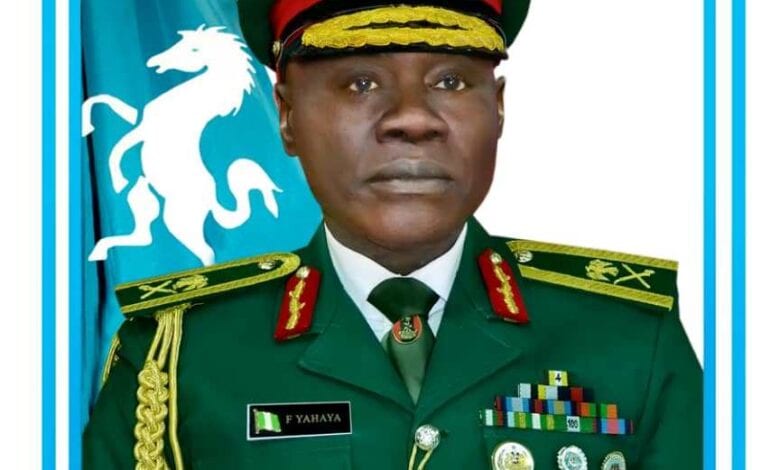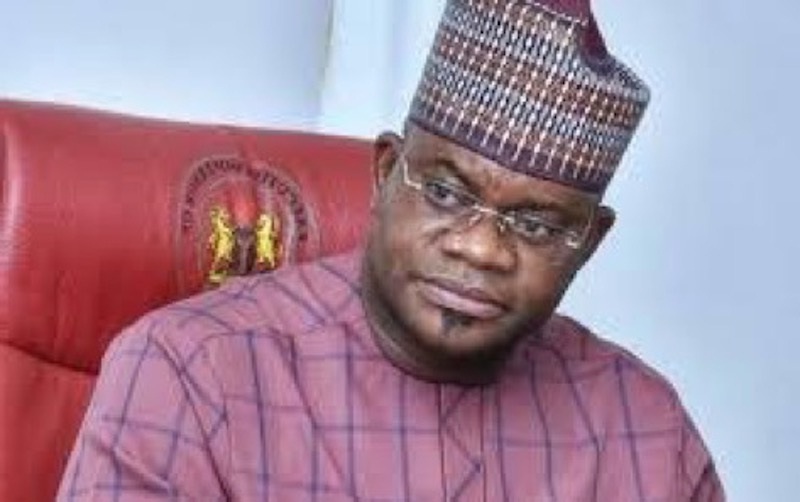security
Media remains key partner in Army’s non-kinetic operations against insecurity — COAS

The Chief of Army Staff (COAS), Lt.-Gen. Taoreed Lagbaja, says the media remains a key partner in the non-kinetic operations of the Nigerian Army in addressing security challenges confronting Nigeria.
Lagbaja said this on Wednesday in Ibadan during the Nigerian Army Civil-Military Cooperation Media Chat for the 2023 Third Quarter.
The News Agency of Nigeria (NAN) reports that the event had the theme “Leveraging Media to Enhance Nigeria’s Internal Security Operations”.
Lagbaja, represented by Maj.-Gen. Bamidele Alabi, General Officer Commanding (GOC), 2 Division Nigerian Army, Ibadan, stated that the chat was aimed at keeping the media informed.
“The chat is aimed at dispeling rumours and provide accurate and timely information to the media as an important segment of nation-building,” he said.
The COAS added that the media chat was very important, especially at this period when the country was battling with a myriad of internal security challenges.
“The Nigerian Army under my leadership has adopted a multi-dimensional approach requiring the collaboration of all, especially the media, in confronting these challenges.
“Thus, a forum such as this media chat is important for a more detailed examination of issues that relate to the Nigerian Army, in order to provide context and other perspectives to the issues.
“Traditionally, the media keeps the society informed of events as they occur, including military operations. It interprets the military to society.
“The military on the other hand is concerned with the successful conduct of its missions which may require the maintenance of operational security required to win wars,” he said.
Lagbaja said further that advancement in information and communication technology and the rise of the new media had opened new vista in media practice.
He pointed out that this has blurred the line between professional media practitioners and amateurs who practise the trade without ethics or responsibility.
“This has changed the dynamics in the media practice to keep society informed and it has also placed an added burden of helping separate genuine news from fake news.
“A media chat, such as this, is an opportunity to dispel rumours, interrogate issues relating to the Army and debunk fake news,” the COAS said.
He noted that the security environment in Nigeria has drastically evolved such that the Nigerian Army is deployed to combat terrorists, insurgents and other criminals in all parts of the country.
“Therefore, the successful conduct of Army operations requires the support and efforts of the people,” Lagbaja said.
The COAS said Nigeria required a healthy military-media relationship.
“This is in order to create a positive perception that will sustain popular support for the Army’s counter-terrorism operations and other operations conducted to secure the country and protect innocent citizens.
“The media remains a key partner in our non-kinetic line of operations for the security of the country.
“So, the Nigerian Army will continue to train and equip its forces to carry out kinetic operations in compliance with the approved rules of engagement and code of conduct for various theatres, within and outside the country,” he said.
Lagbaja added that the the Nigerian Army under his leadership had put in place robust strategies across all lines of operations.
He said this was to ensure that the security challenges in the country were resolved favourably within the shortest possible time.
Earlier, the Army’s Chief of Civil-Military Affairs, Maj.-Gen. Nosakhare Ugbo, had said the Nigerian Army had continued to strengthen the civil-military relationship in Nigeria and had achieved results.
Ugbo said the Nigerian Army had established a civil-military legal desk to address any human rights abuse by troops during operations and other duties.
“The legal desk has received, investigated and treated 95 percent of a thousand complaints received since 2016 and two percent of it is being investigated while the remaining three percent were discharged for lack of merit,” he said.
The event’s Guest Speaker, retired Maj.-Gen. Bamidele Omozoje, called on the Nigerian Army to continue to liaise with the media in its operations in order to prevent misrepresentation and rumour.
security
Yuletide: Police Assure of Security in Ekiti, Ban Fireworks, Unlawful Gatherings

The Police Command in Ekiti has assured residents of the state of adequate security before, during and after the yuletide.
The Commissioner of Police in the state, Mr Akinwale Adeniran, gave the assurance in a statement he personally signed, but issued by the command’s Police Public Relations Officer (PPRO), Mr Sunday Abutu, on Friday in Ado-Ekiti.
Adeniran also sought for more support, collaboration and obedience to law and order by the people of the state.
He said that any form of unlawful gathering, demonstration or protest was unacceptable, stressing the need to sustain the peaceful atmosphere and ensure safety of lives and property of the citizenry.
According to him, intelligence report available has it that some unscrupulous individuals have plans to hide under the guise of protest to unleash mayhem and create apprehension in the state.
“Ekiti State Police Command wishes to appreciate all the residents and good people of Ekiti State for their support, cooperation and collaboration all through this year 2024.
“These have assisted tremendously in nipping crime in the bud and enhancing the peaceful atmosphere currently being enjoyed in the state.
“Parents and guardians are, therefore, implored to advise their wards to shun any act that is inimical to the peace and security of the state, as anyone who runs foul of this directive will be dealt with in accordance with the law,” he said.
Adeniran said that the command had also placed a ban on the sale and use of fireworks, knockouts and firecrackers in the state.
According to him, the items are capable of causing security threat, distractions, unnecessary apprehension and health-related issues.
He also stated that the use of fireworks could create panic and confusion, as it could be difficult to differentiate their sounds from that of the real gunshot.
The police commissioner enjoined residents to be security conscious and promptly report any untoward incident or observation that might be inimical to the peace and security of the state to the nearest police station or call 08062335577. (NAN)
security
Police Nab Man for Allegedly Defrauding Unsuspecting People in Katsina

Police operatives in Katsina State have succeeded in apprehending a suspected fraudster, one Bishir Abdullahi, 37, who specialised in swapping ATM cards of unsuspecting people at ATM points.The police spokesperson, ASP Abubakar Aliyu, told newsmen on Thursday in Katsina that the suspect was found in possession of 14 different ATM cards that belonged to different people.
He said that the suspect was apprehended after a police officer on duty became suspicious of his activities around an ATM machine. The suspect was nabbed by Inspt. Aliyu Muhammad, a police officer on duty at the First Bank branch of Tudun Katsira quarters, Katsina metropolis.“Upon instant search, 14 suspected stolen ATM cards of different banks were found in his possession.“Preliminary investigation revealed that the suspect had been using the stolen ATM cards to withdraw sums of money from his victims’ accounts.”Aliyu further revealed that the suspect withdrew money from about six accounts at different banks.He noted that the suspect was able to withdraw money from his victims’ accounts amounting to N2.7m.He said the suspect would be charged to court upon completion of the investigation. (NAN)security
Joint Security Task Force Apprehends Couple for Alleged Kidnap Threats

The Anambra Police Command and a vigilance group in the state, on Friday, arrested a couple for allegedly issuing kidnap threats to unsuspecting members of the public.
The command’s Police Public Relations Officer, SP Tochukwu Ikenga, disclosed this to newsmen in Awka.
Ikenga identified the couple as Mr Kingsley Okoye and his wife, Chidinma.
“Given reports of text messages and voice notes received by unsuspecting members of the public on threats of abduction, the Joint Security Force, comprising the police and Anambra Vigilance Group, acting on technology driven information in the early hours of today, arrested a couple.
“They are Mr Okoye Kingsley and Mrs Chidinma Okoye, 36 years and 27 years, respectively.
“The duo were arrested in Ozubulu, Ekwusigo Local Government Area of the state,” he said.
Ikenga said that the operatives recovered mobile phones and sim cards from them.
According to him, the couple specialised in sending threat messages to people and demanding ransom or they would be abducted or killed.
He said that the suspects confessed to the crime and admitted to destroying some of the sim cards, which they had earlier used to commit the crime.
The PPRO further said that the Commissioner of Police, Mr Nnaghe Itam, had directed the immediate transfer of the case to the Anti-Kidnapping/Robbery Squad of the command for comprehensive investigation.
Ikenga said that the couple would be arraigned on conclusion of the investigations. (NAN)

















